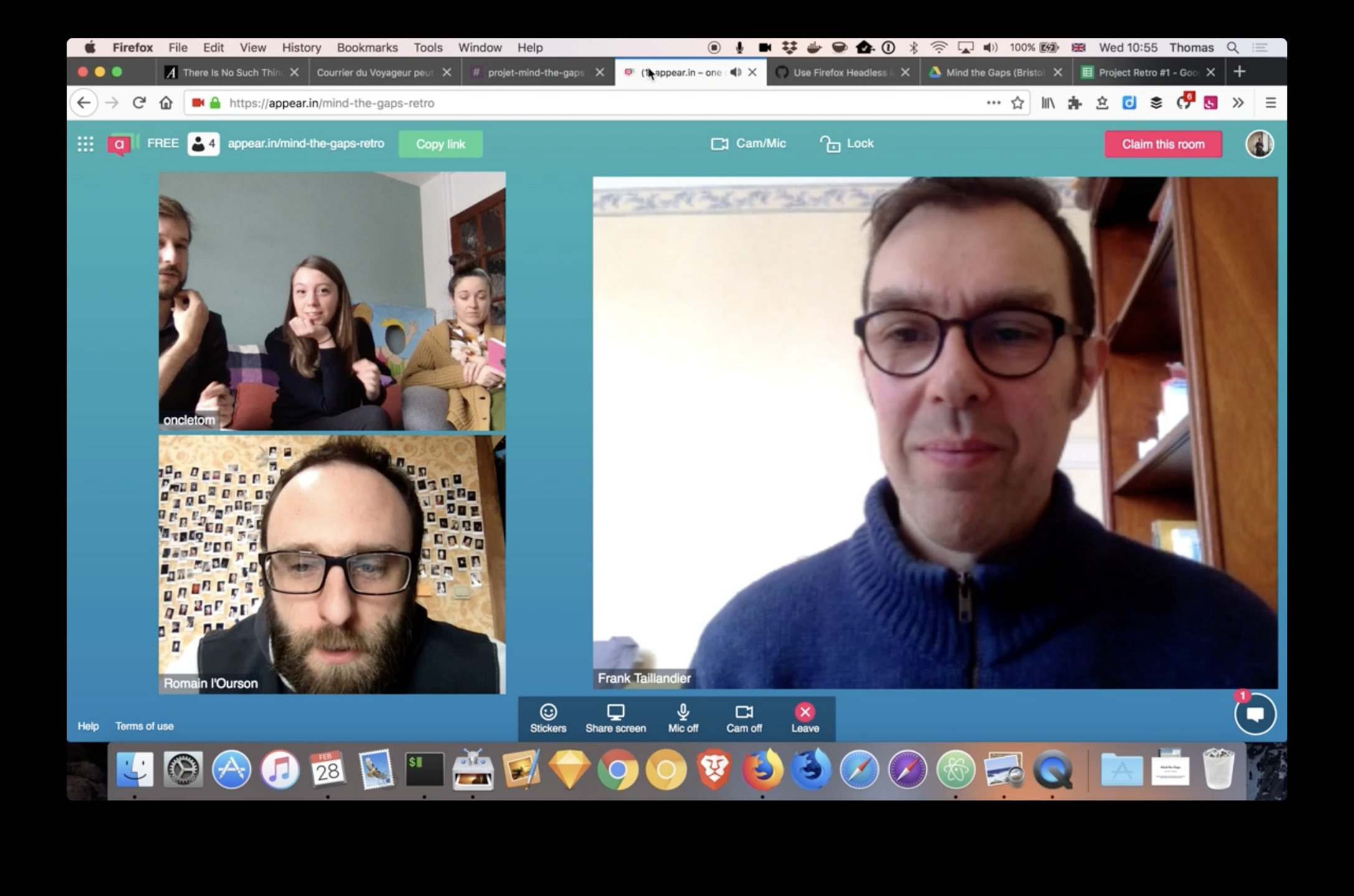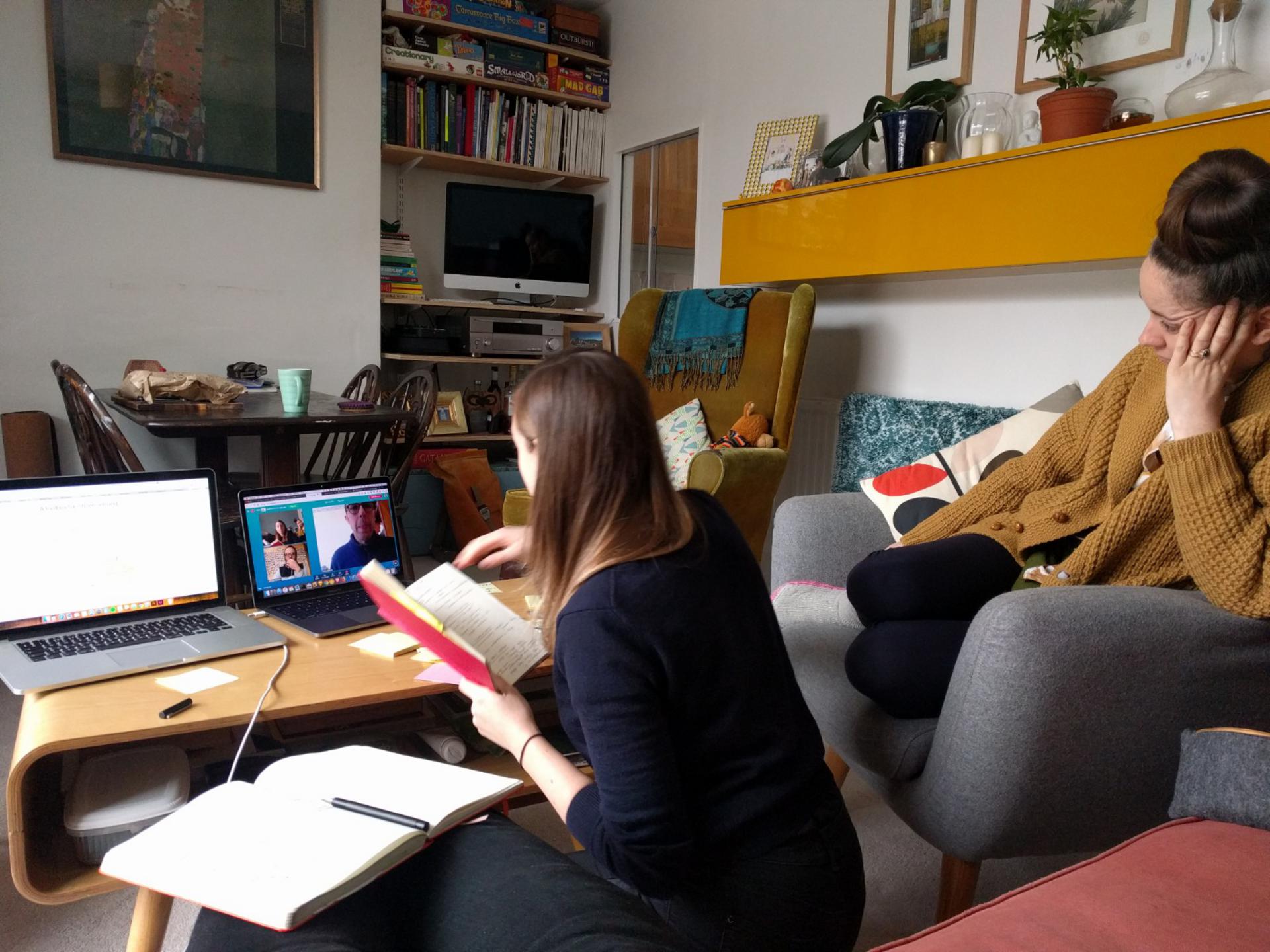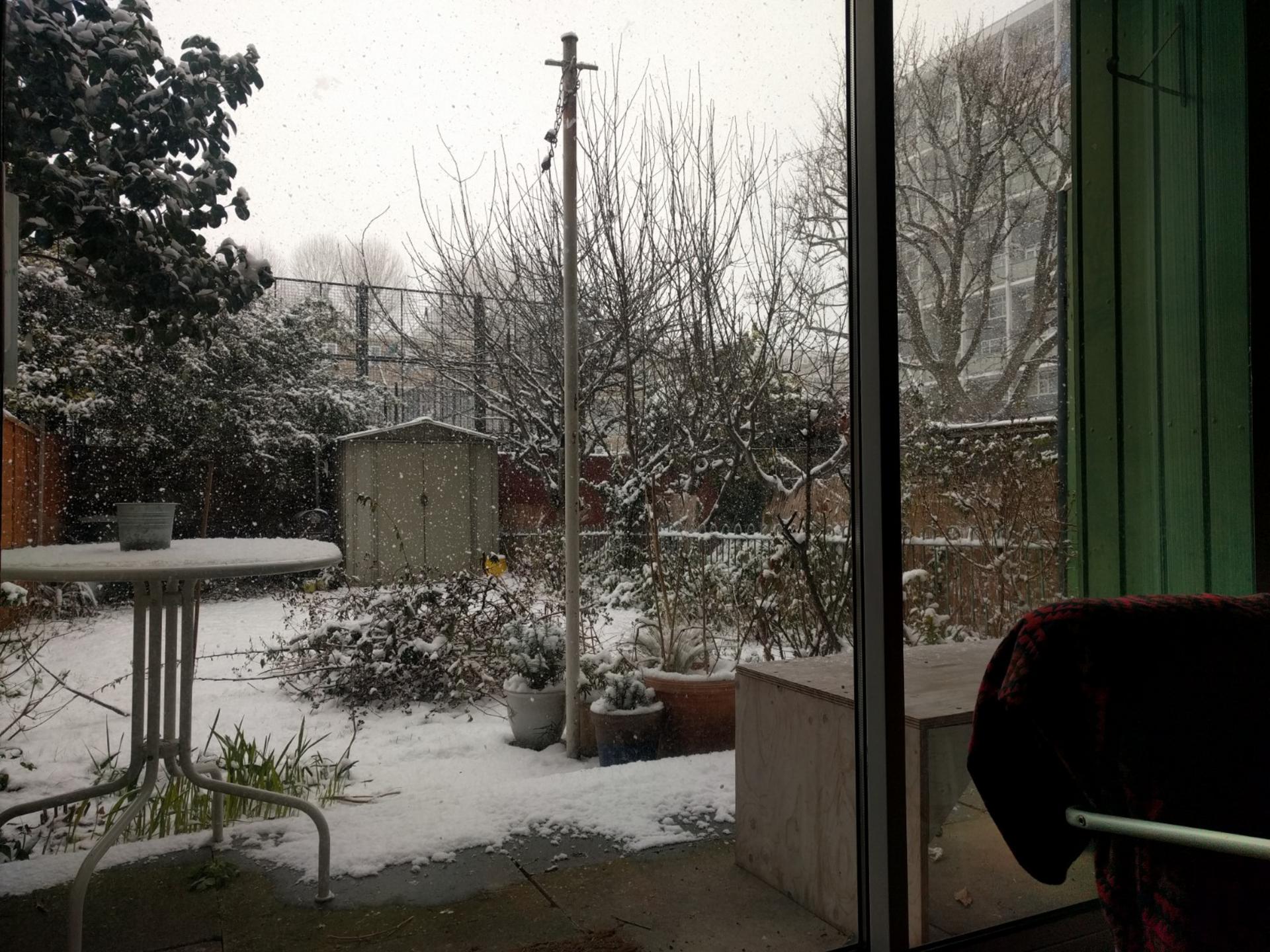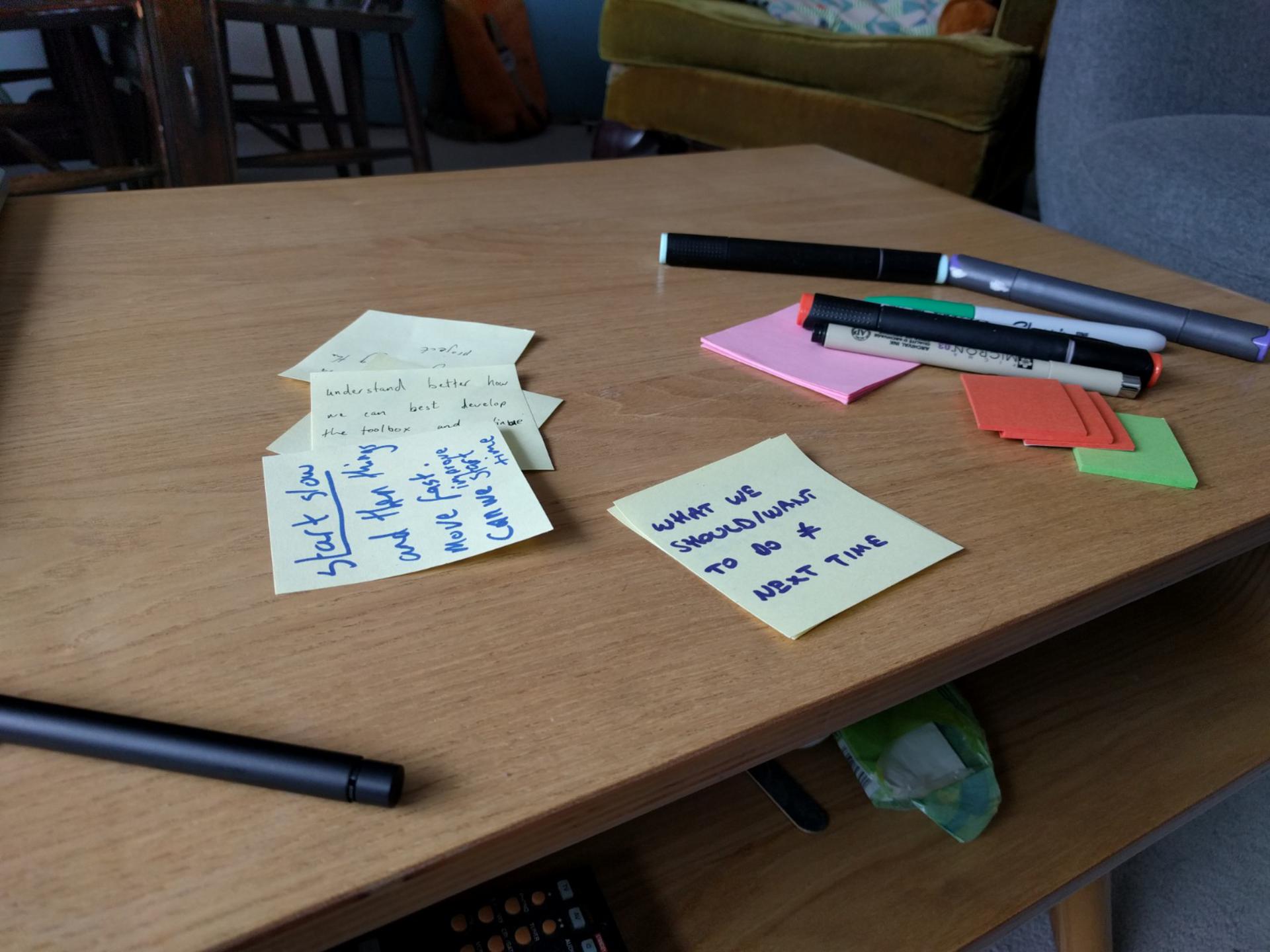End of Project Retrospective
We asked Frank to facilitate the end of project retrospective. Why asking someone external to our team? So as the four of us — Alaine, Noémie, Romain and Thomas — can be participants, at an equal level.
The retrospective used the Lean Coffee workshop format.
Here is the proposed plan:
- Ask for topics to discuss
- Prioritise the topics (we didn’t vote to select the ones the team needs to discuss first)
- Talk
- Define S.M.A.R.T goals

Topic: Catch up
Romain only worked 1 week on the project and had a hard time to catch up because there was many information on the website. He only scanned some pages.
What happened since the early January 2018 work week?
- ODI fortnightly meetings
- breakthrough: mixing quantitative data with qualitative data to give more context (thick data)
- breakthrough: mixed methods • blending ethnographic research with dataset exploration
- ODI project matching
- service design for cities
- open data workshop
- working in the open, documentation
- Field work
- designing and testing the survey in Bristol
- planning to test the survey in Bordeaux (end of March)
- Survey methodology
- open questions to narrow questions
- online + offline form
- Interviews
- Phil Chan
- Bordeaux Maritine ward
- Bristol Avonmouth ward
City comparison:
- Bristol lacks of human numbers
- Bordeaux have them but not stored as data
Quality of Life Survey captures things over 6 weeks, every year. It takes weeks to analyse and to publish.
Mind the Gaps would be realtime, not with a good sample.
Both have sample issues anyway.
Topic: Gaining confidence
Here is how the project is summarized by Romain:
Mind the Gaps is about creating a framework of tools to produce data closer to what citizens experience in their day to day lives. They are meant to be combined with existing data. It would be a more useful feedback as it is one people can understand. The resulting data would help design policies.
Who would run Mind the Gaps? People from the City Hall. But it would not be a good idea. Better for independant organisations to run it. The main problem of the Quality of Life survey is it is run by the City Hall.
The toolbox sketch on the website is the most useful element according to Romain, as it’s very concise. He was looking for the big picture and thinks that kind of info should be on the homepage.
A digital version of the sketches would make them more readable.

Topic: Learned from each other (positives)
- Planning sessions in the morning (kanban style) and closing the day with the retro.
- Keeping track of time (accountability).
- Documentation as we go : Google Docs, website
It helped keeping in touch with external people. It was almost realtime. - Visual communication: sketching sessions, mindmapping.
- Daily team retros: it helped to be more agile, to be heard, to change things the next day, people read it and the ODI loved it.
- Asking early
who are our users?
. It always led us back to concrete actions. - Working together. At the beginning it felt like a waste of time but it keeps us aligned despite the complexity. Everyone is up to date. So it proves to be valuable. It avoided conflict points.
- We only did what we felt was important on the day.
- Field work was super valuable. Going talking ot people. Helps us remove biases. This was not done by the City Hall. A lot of discovery moments. Help us grow our research skills.
- Very open about what we felt, what we were up to or not up to.
It feels right
. - All the feedback given by team members.
Topic: Reflect on work / methods / process
- Morning planning
- Evening retro
- Time planning tool
- Field work
- Co-writing
- Mind mapping
- Sketching
- Kanban
- Catch-up with stakeholders (5,6 face to face. 10, 20 over email)
- Iterative design process
- Making and testing
- GitHub platform
- Jekyll
- Open Source all the things!

Topic: Things we would do differently
- Catching up with the website is difficult. Research page is fine but the website lacks some critical information about the project in general.
- I am less efficient working with 4 people. Better with two.
- How would I have made remote work from Bordeaux useful?
- Romain is not sure if research projects are a thing for him.
- Could Morning routine be more effective? (can take 30 min to 1 hour). We start slow, but once we feel better, then everything moves very quickly.
- Recording Kanban progress as a dataset
- Communication with stakeholders — it took us a while to get a good pace with the ODI. I would ask first next time how they’d like to catch up.
- Trying to communicate clearer rules of interactions (games, workshops). Sometimes I feel things took too long to complete because of a lack of clarity.
- When facing internal conflicts, finding ways to not be dismissive and ask questions instead.
Am I Useful?
Making more time for alone thinking, process thoughts and then bringing that to the group.- Balancing blockers with alternatives.
- Speaking up sooner when I encounter difficulties.
Topic: Develop the toolbox
- Engage with communities group
- How do we engage with a new city?
- Survey is not done yet. Needs more user-testing.
- Convince funders: prove it’s a good idea, have people use it. Reach 100 responses.
- Why should people answer the survey? Should we promote it online? Twitter? Google Ads?
- Translate form in French for Bordeaux testing
- Guide: how do we design questions?
- Solving form usability issues
Topic: Get the project in the open
- What do we need to do before we ask for more funding?
- Improving the website - refine description, information architecture
- Home is for community organisations, citizens and City Hall (product)
- Research is for the ODI, funders and our team (project documentation)
- Refine the toolbox sketch - Digital poster
- Review the website with external people (UX testing with friends)
- How to use the data?

SMART Goals
TBD.
Other comments
- Getting Romain involved on the Bordeaux site? Focus on Bristol first?